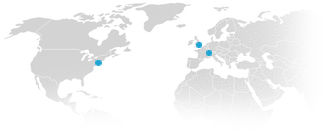The Mabley family spread from Wavendon in the late 18th. Century to Little Linford, then nearby bustling Great Linford. Significantly, Mabley changed
to Mapley with the migration. 1st. Great Linford Generation Little Linford ==> William Mapley (1779 - 23/6/1850) m. Hannah (1778 - 1861) in 1806
2nd. Great Linford Generation John Mapley (1812 - 1891) m. Ann "Nancy" Goss (1817 -) in 1836 Edmund Mapley (31/7/1814 - 21/6/1845) m. Elisabeth Dolton (1819 -) in 1838 3rd. Great Linford Generation 4th. Great Linford Generation 5th. Great Linford Generation
Thomas Mapley's son William became employed as a servant in Great Linford, settled there and started his family. He was later joined by several
siblings, given the commercial opportunities in Great Linford, thus starting new generations.
Great Linford is a village in the Borough of Milton Keynes, Buckinghamshire, on the Grand Union Canal. The name Linford is thought to
derive from the crossing point over the Great Ouse which now separates Great Linford from Little Linford to the north, where there
were Maple trees - the Saxon word for Maple being hlin. The first reference to Linford occurs in 944, when "King Edmund gave to his
thegn Aelfheah, land at Linforda with liberty to leave it to whom he wished"; it appears in the Domesday Book as Linforda.
Great Linford was once a bustling centre of commerce, with shops, farms and a variety of trades represented, including brick kilns,
a stone mason, baker and a blacksmiths; there was even a bank run by the Lords of the Manor. The arrival of the grand junction canal
in 1800 brought huge change, with an influx of new people and business.
Between 1817 and 1864 the village was the site of the junction between the Newport Pagnell Canal and the Grand Junction Canal. For a
hundred years (1867 to 1967) Great Linford was served by Great Linford railway station on the Wolverton to
Newport Pagnell branch line. The village became home to many men who were employed at the vast railway works at Wolverton.
The parish church is dedicated to St Andrew, and dates from 1215. In the early sixteenth century, the rector of this parish Dr Richard
Napier was widely known as a medical practitioner, astrologer and curer of souls. Sir William Pritchard, Lord of the Manor and who was
also president of St Bartholomew's Hospital in London, established a charity school in 1702 in the Almshouses he had founded. A Lace making school
provded some education for vullage girls, although bioys also learned lace making. St. Andrews Church of England Infant School, on the High Street, opened in 1875.
mentioned in Posse Comitatus. Their Children :-
George (1808 - 1884) m. Sarah Reynolds (1808 - 1886) in 1833
Children :-
Children :-
Children :-
Charles Mapley (21/10/1838 - 1881) m. Ann Mapley (29/1/1843 - 1881) in 1866
Children :-
m. Louise Oliver (16/10/1870 - 20/6/1938) in 1901 ==> Newport Pagnell
Harry Charles Mapley (18/5/1873 - 7/7/1939) m. Gertrude Sarah Attwood (5/3/1871 - 15/2/1898)
in 1898, m. Louise Oliver (16/10/1870 - 20/6/1938) in 1901 ==> Newport Pagnell
Children :-
m. Muriel Janet Shrimpton ( - 1980)
Alfred John Mapley (14/6/1902 - 21/4/1979) m. Ella May harper (1903 - 1931) in 1926
m. Muriel Janet Shrimpton ( - 1980)
Children :-



